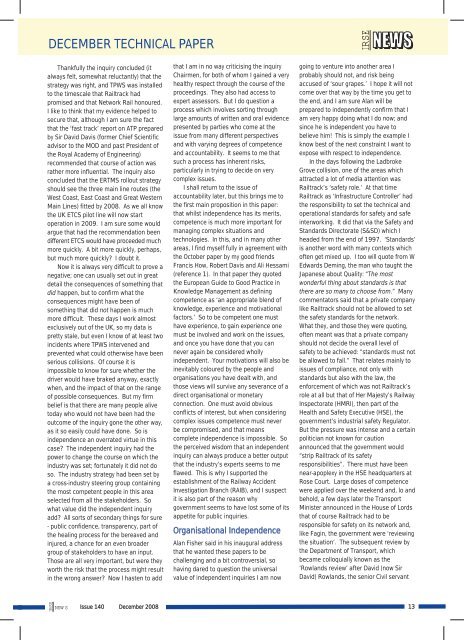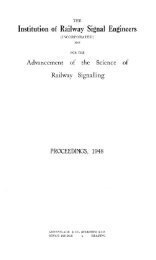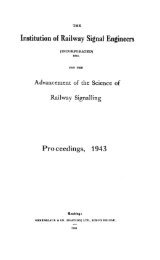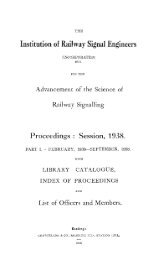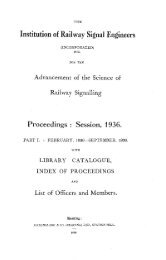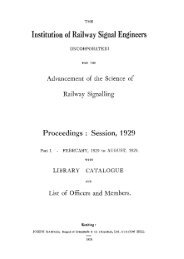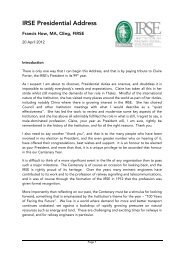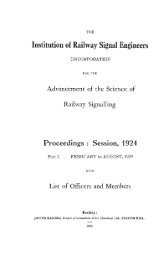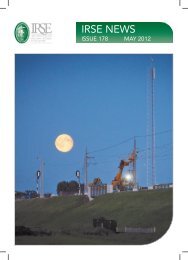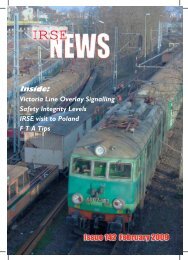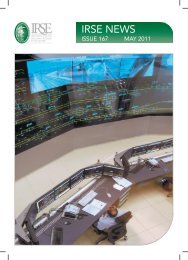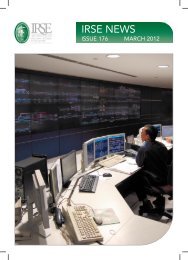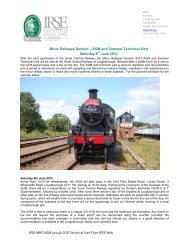IRSE News 140 Dec 08.pdf
IRSE News 140 Dec 08.pdf
IRSE News 140 Dec 08.pdf
You also want an ePaper? Increase the reach of your titles
YUMPU automatically turns print PDFs into web optimized ePapers that Google loves.
DECEMBER TECHNICAL PAPER<br />
<strong>IRSE</strong><br />
Thankfully the inquiry concluded (it<br />
always felt, somewhat reluctantly) that the<br />
strategy was right, and TPWS was installed<br />
to the timescale that Railtrack had<br />
promised and that Network Rail honoured.<br />
I like to think that my evidence helped to<br />
secure that, although I am sure the fact<br />
that the ‘fast track’ report on ATP prepared<br />
by Sir David Davis (former Chief Scientific<br />
advisor to the MOD and past President of<br />
the Royal Academy of Engineering)<br />
recommended that course of action was<br />
rather more influential. The inquiry also<br />
concluded that the ERTMS rollout strategy<br />
should see the three main line routes (the<br />
West Coast, East Coast and Great Western<br />
Main Lines) fitted by 2008. As we all know<br />
the UK ETCS pilot line will now start<br />
operation in 2009. I am sure some would<br />
argue that had the recommendation been<br />
different ETCS would have proceeded much<br />
more quickly. A bit more quickly, perhaps,<br />
but much more quickly? I doubt it.<br />
Now it is always very difficult to prove a<br />
negative; one can usually set out in great<br />
detail the consequences of something that<br />
did happen, but to confirm what the<br />
consequences might have been of<br />
something that did not happen is much<br />
more difficult. These days I work almost<br />
exclusively out of the UK, so my data is<br />
pretty stale, but even I know of at least two<br />
incidents where TPWS intervened and<br />
prevented what could otherwise have been<br />
serious collisions. Of course it is<br />
impossible to know for sure whether the<br />
driver would have braked anyway, exactly<br />
when, and the impact of that on the range<br />
of possible consequences. But my firm<br />
belief is that there are many people alive<br />
today who would not have been had the<br />
outcome of the inquiry gone the other way,<br />
as it so easily could have done. So is<br />
independence an overrated virtue in this<br />
case? The independent inquiry had the<br />
power to change the course on which the<br />
industry was set; fortunately it did not do<br />
so. The industry strategy had been set by<br />
a cross-industry steering group containing<br />
the most competent people in this area<br />
selected from all the stakeholders. So<br />
what value did the independent inquiry<br />
add? All sorts of secondary things for sure<br />
- public confidence, transparency, part of<br />
the healing process for the bereaved and<br />
injured, a chance for an even broader<br />
group of stakeholders to have an input.<br />
Those are all very important, but were they<br />
worth the risk that the process might result<br />
in the wrong answer? Now I hasten to add<br />
that I am in no way criticising the inquiry<br />
Chairmen, for both of whom I gained a very<br />
healthy respect through the course of the<br />
proceedings. They also had access to<br />
expert assessors. But I do question a<br />
process which involves sorting through<br />
large amounts of written and oral evidence<br />
presented by parties who come at the<br />
issue from many different perspectives<br />
and with varying degrees of competence<br />
and accountability. It seems to me that<br />
such a process has inherent risks,<br />
particularly in trying to decide on very<br />
complex issues.<br />
I shall return to the issue of<br />
accountability later, but this brings me to<br />
the first main proposition in this paper:<br />
that whilst independence has its merits,<br />
competence is much more important for<br />
managing complex situations and<br />
technologies. In this, and in many other<br />
areas, I find myself fully in agreement with<br />
the October paper by my good friends<br />
Francis How, Robert Davis and Ali Hessami<br />
(reference 1). In that paper they quoted<br />
the European Guide to Good Practice in<br />
Knowledge Management as defining<br />
competence as ‘an appropriate blend of<br />
knowledge, experience and motivational<br />
factors.’ So to be competent one must<br />
have experience, to gain experience one<br />
must be involved and work on the issues,<br />
and once you have done that you can<br />
never again be considered wholly<br />
independent. Your motivations will also be<br />
inevitably coloured by the people and<br />
organisations you have dealt with, and<br />
those views will survive any severance of a<br />
direct organisational or monetary<br />
connection. One must avoid obvious<br />
conflicts of interest, but when considering<br />
complex issues competence must never<br />
be compromised, and that means<br />
complete independence is impossible. So<br />
the perceived wisdom that an independent<br />
inquiry can always produce a better output<br />
that the industry’s experts seems to me<br />
flawed. This is why I supported the<br />
establishment of the Railway Accident<br />
Investigation Branch (RAIB), and I suspect<br />
it is also part of the reason why<br />
government seems to have lost some of its<br />
appetite for public inquiries.<br />
Organisational Independence<br />
Alan Fisher said in his inaugural address<br />
that he wanted these papers to be<br />
challenging and a bit controversial, so<br />
having dared to question the universal<br />
value of independent inquiries I am now<br />
going to venture into another area I<br />
probably should not, and risk being<br />
accused of ‘sour grapes.’ I hope it will not<br />
come over that way by the time you get to<br />
the end, and I am sure Alan will be<br />
prepared to independently confirm that I<br />
am very happy doing what I do now; and<br />
since he is independent you have to<br />
believe him! This is simply the example I<br />
know best of the next constraint I want to<br />
expose with respect to independence.<br />
In the days following the Ladbroke<br />
Grove collision, one of the areas which<br />
attracted a lot of media attention was<br />
Railtrack’s ‘safety role.’ At that time<br />
Railtrack as ‘Infrastructure Controller’ had<br />
the responsibility to set the technical and<br />
operational standards for safety and safe<br />
interworking. It did that via the Safety and<br />
Standards Directorate (S&SD) which I<br />
headed from the end of 1997. ‘Standards’<br />
is another word with many contexts which<br />
often get mixed up. I too will quote from W<br />
Edwards Deming, the man who taught the<br />
Japanese about Quality: “The most<br />
wonderful thing about standards is that<br />
there are so many to choose from.” Many<br />
commentators said that a private company<br />
like Railtrack should not be allowed to set<br />
the safety standards for the network.<br />
What they, and those they were quoting,<br />
often meant was that a private company<br />
should not decide the overall level of<br />
safety to be achieved: “standards must not<br />
be allowed to fall.” That relates mainly to<br />
issues of compliance, not only with<br />
standards but also with the law, the<br />
enforcement of which was not Railtrack’s<br />
role at all but that of Her Majesty’s Railway<br />
Inspectorate (HMRI), then part of the<br />
Health and Safety Executive (HSE), the<br />
government’s industrial safety Regulator.<br />
But the pressure was intense and a certain<br />
politician not known for caution<br />
announced that the government would<br />
“strip Railtrack of its safety<br />
responsibilities”. There must have been<br />
near-apoplexy in the HSE headquarters at<br />
Rose Court. Large doses of competence<br />
were applied over the weekend and, lo and<br />
behold, a few days later the Transport<br />
Minister announced in the House of Lords<br />
that of course Railtrack had to be<br />
responsible for safety on its network and,<br />
like Fagin, the government were ‘reviewing<br />
the situation’. The subsequent review by<br />
the Department of Transport, which<br />
became colloquially known as the<br />
‘Rowlands review’ after David (now Sir<br />
David) Rowlands, the senior Civil servant<br />
<strong>IRSE</strong><br />
NEWS Issue <strong>140</strong> <strong>Dec</strong>ember 2008 13


